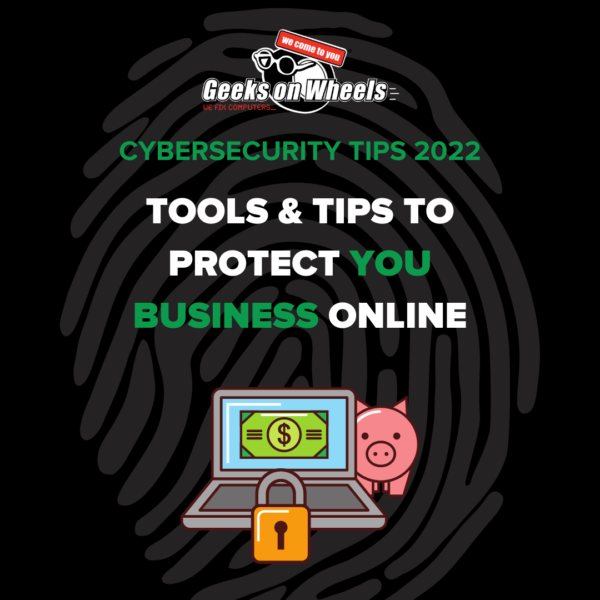Hello, Geek Businesses! This month we’re putting a spotlight on cyber security, and focusing on how to protect your business online. So we’ve put together some of our best tips and tools to help you keep your company safe.
Cyber security has become a major concern for many Kiwi businesses over the past few years, and for good reason. The 2021 HP New Zealand IT Security Survey found that cybersecurity attacks on small businesses occurred twice as often in 2021 as they did in 2018. Just over half of survey respondents (54%) saw evidence of security breaches in the past year in their workplaces. For the sake of your brand, your customer safety, and your business, it’s vital to take steps for better cyber security. Here are our top tips and tools for how to protect your business online:
Use 2FA /MFA (two-factor authentication / Multi-Factor Authentication)
Set up two-factor or multi-factor authentication for both your customers logging into their accounts and for staff signing on to your internal system. This system easily adds an extra level of security.
This would generally entail a standard password for the first step. For the second step, this could be an automated call, text, or email that sends a code to users. Alternatively, the second step could be a question that requires the correct answer for entry. This system is simple and easy to implement, and only adds a few seconds to the user. In return, you get a stronger security system that ensures protection even if passwords are compromised.
Install software updates
Software updates and patches are extremely common for modern tech. You’ll find them on everything from your mobile phones and laptops to systems. That usually means you’ll get regular reminders to install those updates, which can, unfortunately, lead users to ignore them.
However, it’s important to ensure these software updates are implemented. They are often simple functionality updates. But they also often include security updates that fix weak spots or holes in the system. Ideally, you’ll set up the whole system to update automatically. If this isn’t an option, ensure staff know the importance of allowing these updates to install. And don’t forget, when manufacturers classify the hardware as “end of life” it may no longer receive important security updates and may need replacing.
Secure your network
Whether you keep data on a server in the office or online, securing your network will help to keep data on your devices safe. This basically boils down to connections coming into your business, and connections going out. You will need to ensure these connections are secure and restricted to only what you need.
There are a few different ways to do this, depending on your setup. For example, if you have employees logging into your systems remotely, you can use VPN software to control access. You can also set up your servers behind firewalls to control its connections both inside and outside the business.
Back up your data
Losing your business data is a nightmare for any company, and the fallout from having it leaked or stolen can be devastating. That’s why it’s extremely important to back it up, so it can be restored if need be.
As a minimum, you should have a physical backup as well as an online-based backup. This ensures that your data is safe whether your cloud provider somehow fails, or if an emergency occurs on-site and you can’t access your physical backup. Online-based backup systems such as Backblaze and IDrive are easy to set and forget for business backups.
Set up logs
It’s important to do everything you can to stop breaches before they occur, but it’s also useful to know when they do. Setting up logs can help you find out when an incident occurs, but also can give you a warning that one is in the process.
You can set up logs for numerous things, such as failed login attempts on some email or account systems. The system will alert you to the issue, so you can judge if the attempts are legitimate or fraudulent. Some of the logs you might be able to enable include password changes, denied authentications, suspicious network connections, and more.
Secure your devices
Finally, be sure to secure your devices. Whether that’s your desktop computers in the offices or personal computers that staff can use at home, security is essential. Anti-malware software should be in place on any device that accesses your systems. Your device likely has built-in protection, but with ever-increasing cyber threats to businesses, additional third-party Anti-Malware protection is always recommended.
You might consider AVG Antivirus, Malwarebytes, or ESET. You can install these programs across most of your devices (tablets, phones, computers, etc), where they will protect devices from viruses and ransomware. Our Geek+ Premium for Business comes with a Malwarebytes Anti-malware subscription. Watch this quick video to see how Malwarebytes keeps you secure.
Get help from the Geeks
Cyber security is essential for any business, and for many business owners, it’s easier to get help from professionals.
Our Geek+ Business program is an annual subscription that ensures you have unlimited* technical help at the other end of the phone all year round. You’ll also save on call outs, and get a free health and security check for your devices.
Get in touch to find out more or get set up with a Geek who can help protect your business online.
